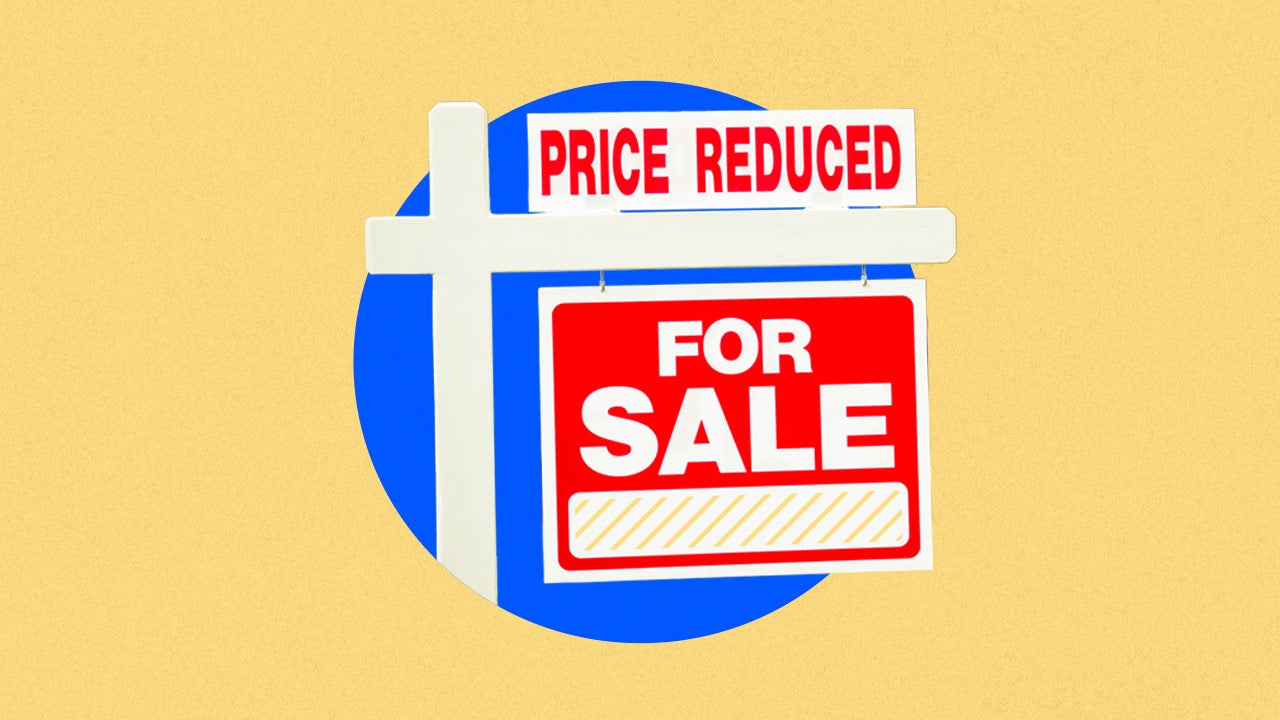Images by Getty Images; Illustration by Issiah Davis/Bankrate
Key takeaways
- If you’ve had no offers, or solely lowball offers, it’s possible that buyers see your house as overpriced.
- Similarly, if your home has been on the market for longer than the local average, buyers may be seeing better value elsewhere.
- Your real estate agent can help you decide whether it’s time to reduce your price, and by how much.
Once you decide to list your home for sale, it’s important to set the right asking price from the start. But sometimes, even if you think the list price is appropriate, your home might still linger on the market for longer than you expected. How long is too long? Here’s how to figure out whether it’s time to consider a price reduction to attract a buyer.
When to lower the price on your house
You’ve enlisted the aid of a skilled real estate agent who’s performed a thorough comparative market analysis to determine the value of your home. You’ve listed the property at what you both believe is an accurate price, and you’ve hosted many showings, but so far, no one has made an offer.
So why hasn’t your home sold?
“Pricing is usually the reason,” says Gordy Marks of RE/MAX Northwest in Kirkland, Washington. “Most other issues can be overlooked if your price is right.”
The condition of the home might also explain why you’ve received no offers: If it needs upgrades or repairs, or lacks curb appeal, buyers may be turned off.
You could also find yourself with no offers if you use the wrong marketing strategy. “If a home doesn’t have the right photos or marketing, or isn’t positioned in its local market properly, it may not sell,” says Maria Quattrone of RE/MAX @ Home in Philadelphia.
The local absorption rate — the rate at which available homes are sold during a specific time frame — might also affect your ability to sell quickly and for top dollar. “If there’s a large volume of inventory, your home may sit on the market for a bit,” says Peggie McQueen, a broker associate with LPT Realty in the Tampa Bay, Florida area.
Here are some scenarios that may indicate your asking price is too high:
- Little traffic and no offers: If showings are sparse and no offers are coming in, it could mean buyers see the home as overpriced.
- Good traffic but only lowball offers: This may mean your home is priced slightly above market value. A small price adjustment could bridge the gap and attract more interest.
- Good traffic but negative reactions: If buyers are showing up but feedback is negative, it’s time to see if similar homes are priced lower.
- On the market for too long: If your listing has outlasted the typical number of days on market for your area, it’s likely time to reevaluate the price.
How long should a house be on the market before you reduce the price?
There are many factors to consider when deciding how long is long enough. Expert tips include:
- Make price adjustments early: If you do decide to reduce the price of your home, experts agree you should do it relatively quickly — if possible within the first few weeks of initially listing it for sale. “You’re almost always going to get the most activity on any property in the first 21 days on the market, so you don’t want to miss that window,” says Quattrone.
- Observe your local market: The exact period of time you should wait also depends on indicators in your local housing market, including average days on market for homes listed in your area. In April 2025, existing-home listings in the U.S. remained on the market for an average of 29 days, according to the National Association of Realtors. Your agent can help you decide on the best timing.
- Consider adjusting after just 10 days: “We recommend a price adjustment after 10 days on the market,” says Dustin Fox of Fox Homes in Fairfax, Virginia. “This gives you time for two open houses on back-to-back weekends. Don’t reduce the price too late, because buyers then look at your days on the market as an opportunity to save money and lower their offers.”
- Reevaluate pricing after 30 days: “Do a hard reevaluation with your broker on pricing by no later than the 30-day mark,” says Ruth Shin, founder and CEO of PropertyNest in Brooklyn, New York. “You don’t want to wait too long, or your listing will become much less attractive to buyers.”
How many times to cut the list price, and by how much
- First, know your bottom line: Overall, it’s best to determine ahead of time the absolute lowest price you’re willing to accept, so that you can make price adjustments as necessary within that range.
- Be strategic: Some real estate agents suggest adjusting your asking price as many times as needed in order to make the sale — but at strategic intervals. “No one likes to do price reductions, but you may have to do more than one,” says Quattrone. “As the number of days on the market increases, so can the need for price adjustments.”
- Make the reductions meaningful: A small drop might not be enough to move the needle. “You probably want to reduce by more than 3 percent, at minimum,” says Marks. Consider pricing thresholds to boost visibility in search filters (for example, don’t drop from $409,900 to $400,000 — drop to $399,900 to show up in sub-$400K searches).
- Consider your original asking price: “If your home was originally priced on the high side, it may not be unreasonable to reduce it by 4 or even 7 percent,” says Shin. On the other hand, if you’re close to fair market value, a reduction of 0.5 to 3 percent may be enough to attract attention without signaling desperation.
- Limit the number of reductions if possible: “Any more than three will cause buyers to think something is wrong with the property,” says Shin.
Things to try before lowering your home price
Before you cut your price, it may be worth trying other strategies first. For example:
- Upgrade your listing photos: If you don’t already have them, adding high-quality, professional photos with good lighting can dramatically increase buyer interest.
- Think about staging: Similarly, a nicely staged home can make it seem more welcoming and help potential buyers imagine themselves living there.
- Rewrite your listing description: Make sure your home’s description highlights its best features first, as well as any notable recent upgrades.
- Enhance the curb appeal: Seemingly basic things like sprucing up the yard, repainting the front door or even washing the windows can all help make a better first impression.
- List on multiple platforms: Talk to your agent about making sure your home is visible on sites like Zillow, Realtor.com and even Facebook Marketplace.
- Consider getting an appraisal: A professional home appraisal can help determine a more accurate price for your home.
Bottom line
If your home isn’t attracting the kind of offers you want — or any offers at all — it may be time to reconsider your asking price. Today’s buyers are well-informed and will quickly move on if a home feels overpriced. Work closely with your real estate agent to set the right price from the start, and adjust it if needed, to help you bring in the best deal possible.
FAQs
Read the full article here
















